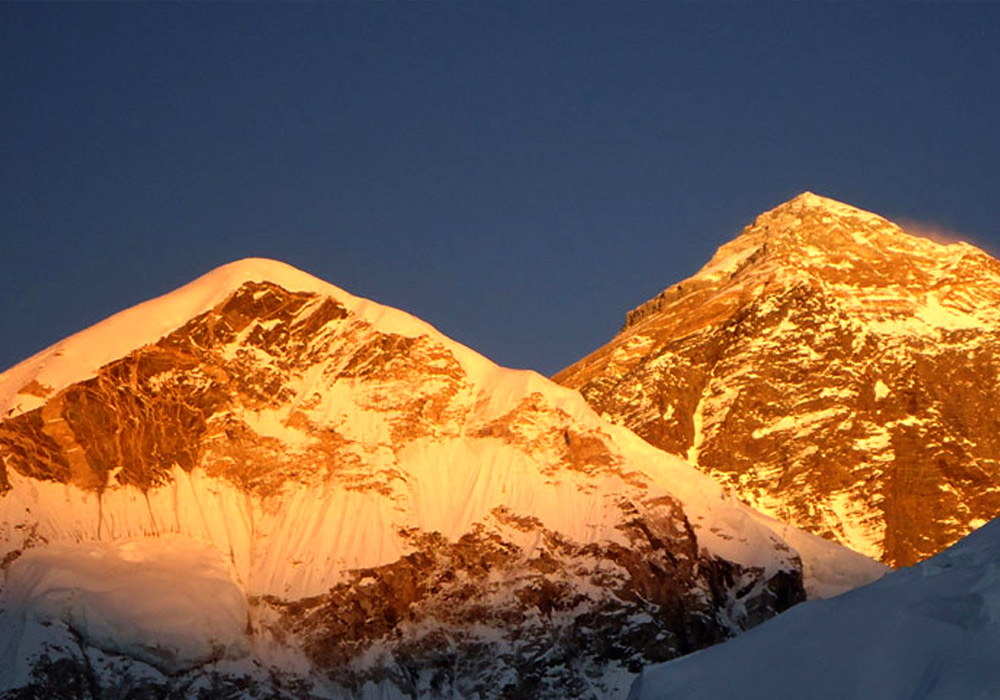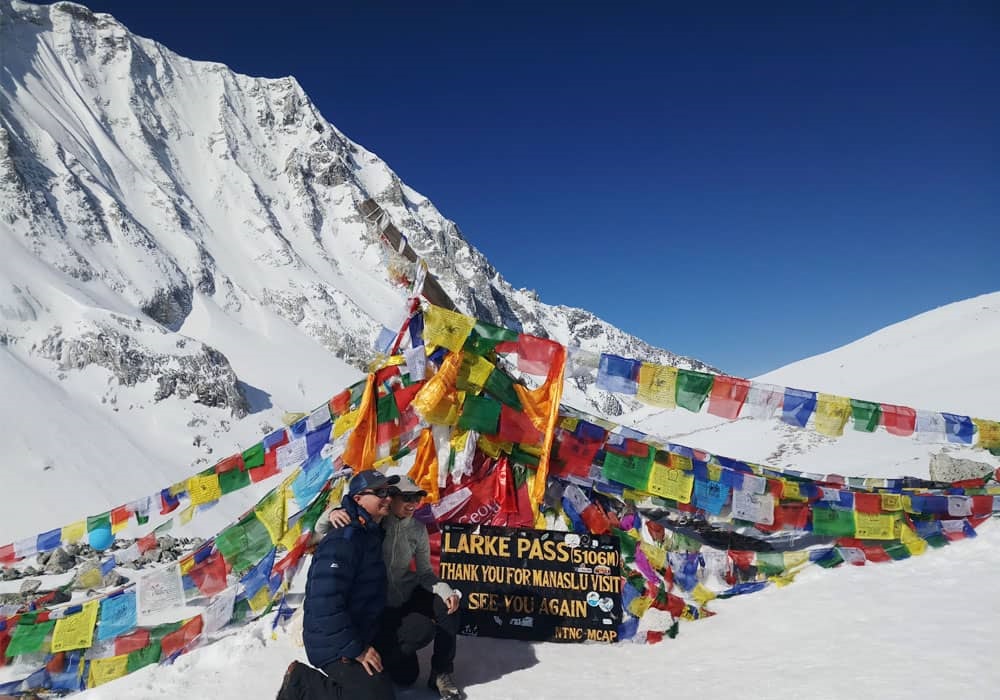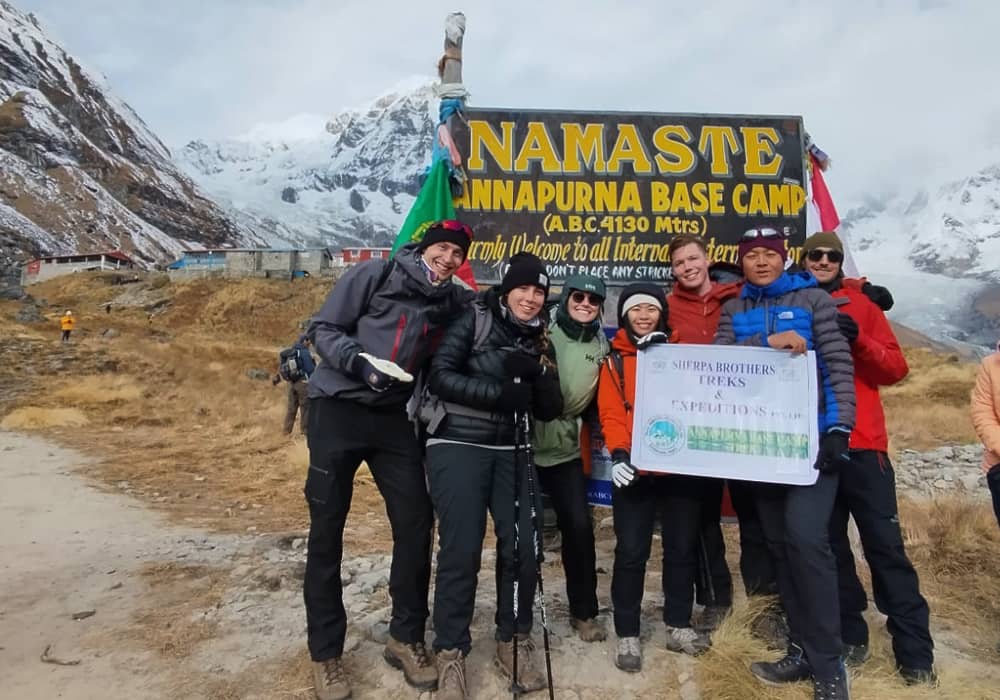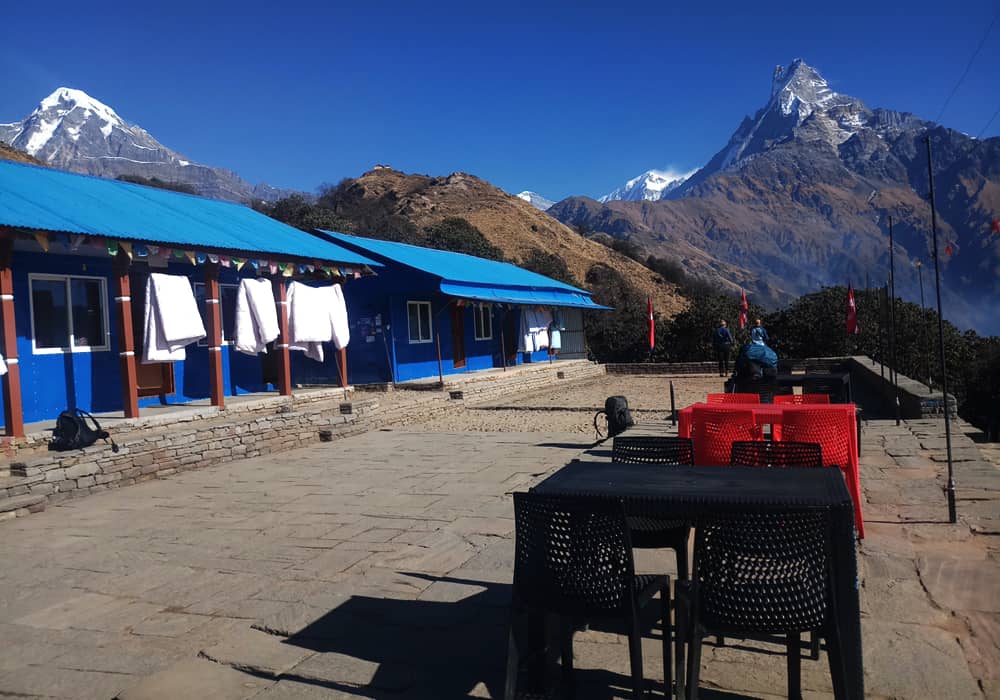The trail on this Gokyo Chola cross trek has a number of challenging walking sections, because of the escalating altitude and the changing topography. The highest point in the Chola Pass region, between 5,420 and 5,555 meters, is a physically demanding part an average 7 to 8 hours walk and can expect to cover a distance of about 10 kilometers per day. The route entails a forward stroll, a rocky ascent, a descent, and a bridge crossing. Even though the majority of the first-day hike begins at a lower elevation, the steady, leisurely pace of walking gives hikers a sincere sense of success and accomplishment. Acclimatization is crucial in the increasing altitude, in order to adapt to the high altitude and prevent altitude sickness. It allows your body to adjust to the decreasing oxygen levels and reduces the risk of any health complications during the trek. Additionally, there will be rest day in Namche and Machhermo will also give you the opportunity to explore the local culture and enjoy the breathtaking views of the surrounding mountains including Mt Choyu, Everest, Makalu, Thamserku. Our team of professionals is dedicated to ensuring your safety and comfort throughout the journey. With their expertise and assistance, you can focus on creating unforgettable memories and achieving your travel goals. The important thing is to have a willingness to challenge yourself and push your limits. Whether you’re just starting out or have been hiking for years, there will always be opportunities for growth and improvement. Hiking and walking since couple of month earlier of this trek is a great way to improve your physical health and build endurance over time.
It is important that participants with pre-existing health check problems or conditions should make these known to us at the time of booking. This information is crucial for us to ensure the safety and well-being of all participants during the event. So that, we can make necessary arrangements and provide appropriate support if needed.
Accommodation and Food during Gokyo Chola cross trek
In Kathmandu: 3 star hotel Deluxe with bed and breakfast on twin sharing.
On trek: 12 days twin sharing accommodation in a tea house (trekking guest house) with 3 meals, (Break fast, Lunch, Dinner and Tea/ Coffee) on full board. The tea houses along the trekking route provide basic but comfortable accommodations, with twin sharing rooms available. These tea houses also offer a variety of delicious home cooked meals to keep you energized throughout the day, including breakfast, lunch, and dinner. Additionally, you can enjoy hot drinks such as tea or coffee to warm up after a long day of trekking.
Travel insurance
Sherpa Brothers Treks and Expedition Pvt/ Ltd. take every care to make our treks safe and enjoyable. All our routes are scouted to ensure the trails are safe and the facilities along route are of an acceptable standard. In addition, we have vast experience of trekking at altitude and are trained to deal with Acute Altitude Sickness. However, due to terrain, weather and altitude, risk is not always predictable in the Himalaya. To ensure you have a worry free time with us, personal travel insurance is essential to cover the cost of unforeseen accident, illness or rescue. The costs involved can be large and personally overwhelming in the unlikely event of accident or injury.
All Nepalese staff, guides and porters employed by Sherpa Brothers Pvt. Ltd. are covered locally but we regret that we cannot offer insurance for our clients.
Sherpa Brothers Treks and Expedition Pvt. Ltd. is not liable should anything go wrong due to unforeseen circumstances.
When choosing an insurance policy be sure to confirm with your insurer that your policy covers adventure holidays and trekking at high altitude. Some insurers makes special exception for these types of trip so please read the small print and contact your insurer if you are unsure.
When is the best time to do Gokyo Chola Pass Trek ?
While Nepal can be visited all year, the best times to go walking and trekking to Gokyo Chola Cross trek are in the spring (late February – May) and autumn (late September-Mid December).
Autumn; The best time of year to do Manasalu Circuit trek is supposedly in the autumn. With dry weather and crisp, clear skies, the mountain views are at their best. Since the summer monsoon, the countryside has been lush and green.
Spring; As the weather warms up in late February and May wide variety of trekking options become available. The gorgeous magnolia and rhododendron will be in bloom, even though the skies may be cloudier than in the fall. If you want to trek in Nepal in the both fall and spring time, the trails can get crowded during this time and tea house accommodation fill up fast. During this time of year.
Winter; Generally, winter brings bright, dry days, though the evenings are bitterly cold at altitude and snow can block certain path. Winter can be an excellent time to visit Nepal and to do this trek, because there are fewer tourists. Even though incase of blizzard weather, heavy snow trekking to Gokyo Chola Cross region might not be feasible during this season due to snow the high passes such as Chola la 5400 m can be blocked and tea house are closed.
How many permits will I need for Gokyo Chola Cross Trek ?
If you’re planning to trek to the Gokyo Chola Cross Trek, you require the Sagarmatha National park entrance Permit and Khumbu Pasang Lhamu rural municipality permit. These permits are mandatory to enter the areas along the trekking route in order to protect trekkers’ data and for their safety. The permits also help fund conservation efforts and support local communities.
Required gears check list for Gokyo Chola Cross Trek.
Having the right gear ensures that you are prepared for adventure and all challenges or emergencies that may arise during your mountain adventures. From proper clothing and footwear to essential tools and safety equipment, your gear provides the necessary support and protection needed to navigate through rugged terrains and unpredictable weather conditions.
Below we present you a require complete packing list suitable for this trek,
Hiking gears for Gokyo Chola Cross Trek.
Day bag 1 – A porter will carry your primary gear in duffel bag (up to 12kg per trekker). You’ll need to bring your own daypack. 30–35L is adequate.
Dry Bag 1 – This protects your bag and clothing from potential moisture, wet object and rain.
Walking pole 1 – ( if necessary) Trekking poles can decrease the impact on your joints by up to 20%. They are excellent for knees while going down. We recommend adjustable Black Diamond trekking poles.
Water bottle or camel bag 1 – Capacity to carry 3 litre of water. Options: 2 x 1.5 litre wide mouth nalgene bottles or 2 litre platypus + 1 litre water bottle.
Head light 1 – You will need a headlamp with a good light output for any late-night restroom trips, as well as importantly for Gokho Ri hike, Chola La pass and Kalapathar hike day. Petzl make renowned and affordable headlamps.
Knife / Multi tools – 1
Cloth and body wear
Down jacket 1 – You’ll need this for the Hiking, crossing day as well as in the evenings at lodge camp when you’re tired, you feel the cold a lot more.
Sleeping bag 1 – rated 0°F, -20°F.
Light or medium wight warm hiking trouser 2 – an option of convertible trousers.
For the colder parts of the trek you’ll need good winter hiking pants – just make sure they are breathable.
Warm liner 1 – For extra warmth in sleeping bag.
Warm sun hats 1 – lot of heat is lost through your head, so be sure to get a warm thermal hat as well as one that protects your neck from the harsh rays of the sun.
Fleece / jacket and pants 1 – Modern technical fleeces (such as Polartec) make excellent insulation layers.
Windproof jacket and Pants 1 – pants with full-length zips make getting them on and off quick and easy.
Long and half sleeve hiking shirt 3 – As per you body size lightweight, moisture wicking long and short sleeved shirts.
Buff for (neck and head) – 1
Walking boot 1 – We recommend light- to mid-weight waterproof boots with good ankle support. You don’t need to go full-mountaineering boot.
Gloves / mittens 2 – For the cold nights through the trek and for the larke pass day, we recommend heavyweight, insulated, preferably water resistant gloves.
Warm hiking socks (wool / synthetic) 3-4, pairs of outer socks and 2-3 pairs of liner socks. We also recommend bringing 1 x thick thermal socks for larke day.
Gaiter 1 – Help keep your trousers clean in dusty, wet and muddy trail conditions
Flip flap/ Sandal 1 – To wear around after a day’s trek we recommend bringing a pair of sandals
Sun protection, health hygiene and water
Sun cream 1 – SPF 40+ Sunscreen is very important as the sun’s rays are much stronger at altitude.
Sun glass 2 – (incase of one broke) choose high UV protection glasses of any brand as sun intensity after 3500 is very high.
Sun hat 1 – if possible go for a hat that is wide-brimmed for protection, and has a neck cover if you aren’t going to be wearing a neck gaiter
Lip guard 1 – To keep your lip moisturized in dry air and the stronger sun ray
Tooth brush – 1
Face wash soap – 1
Sanitizer wipes – 2/2, You won’t be showering at altitude, so anti-bacterial ‘wet wipes’ are a good way of maintaining personal hygiene.
Towel – 1
Electrolyte/Sports drink powdered formula for adding to your water Water can get pretty boring, so it’s a good idea to bring along an electrolyte formula that’s flavored to your liking.
Snacks energy bars of your preference – plan for 2-4 per day Snacks such as energy bars, trail mix, and candy can help give you a quick energy boost while on the trail. Just avoid anything with caffeine in it.
Ear plugs – For light sleepers. Snoring travels in quiet high altitude lodges
Prescription medicine
Water purifier tablet / lightweight pen filter
Toilet paper – Bring two rolls of toilet paper, one to keep in your daypack for use on the trail, and one in your duffel for use at tea house camp. Taking the cardboard center out makes it easier to transport.
Menstrual product for her
Diamox (if using)
Blister plasters – different shapes and sizes
Antibiotic cream or ointment
Hairbrush/comb
Foot powder
Nail cutter
Personal belonging items
Passport
Cash Visa / credit card
Cell phone
Power bank backup and charger – The standard voltage of electricity in Nepal is 230 V and the frequency is 50 Hz. You can use your electric or electronic appliances in Nepal without a voltage converter.
Camera / Gopro
Reservation cancellations policy
There will be no fees associated with cancellations made more than 45 days prior to departure.
A penalty of 30% of the total trip cost will apply for cancellations made between 30 and 44 days prior to departure.
60% of the total trip cost will be lost for cancellations made between 15 and 29 days prior to departure.
If a cancellation is made 14 days prior to departure, there will be no reimbursement.
Additional specifications
When making your reservation, please let us know about any special needs you may have so that we can make responsible efforts to accommodate your requests and special requirements, as long as the locations and resources allow.




 Trip Grade : Moderate
Trip Grade : Moderate Trip Durations : 12 Days From Kathmandu
Trip Durations : 12 Days From Kathmandu Highest Point : 5,365m / 17,602ft
Highest Point : 5,365m / 17,602ft Best Season : Sep, Oct, Nov - Mar to June
Best Season : Sep, Oct, Nov - Mar to June Meal Plan : Breakfast in Kathmandu and Full board on Trek
Meal Plan : Breakfast in Kathmandu and Full board on Trek

